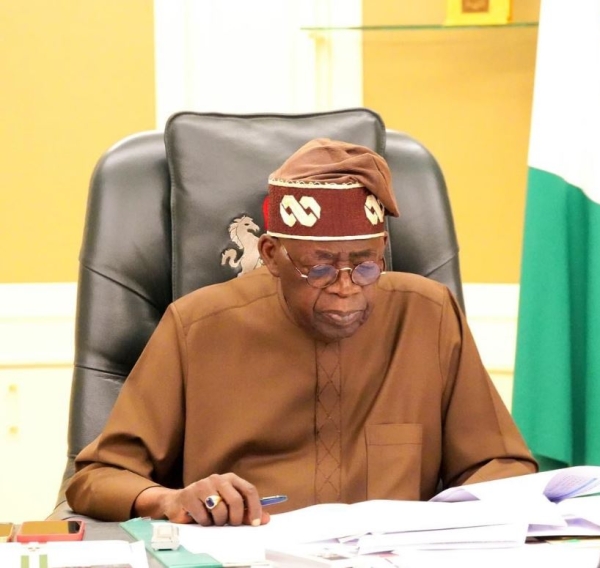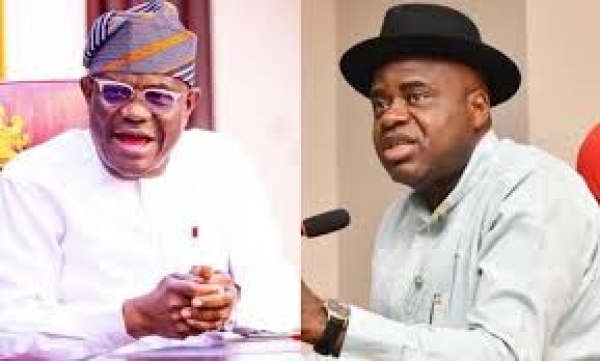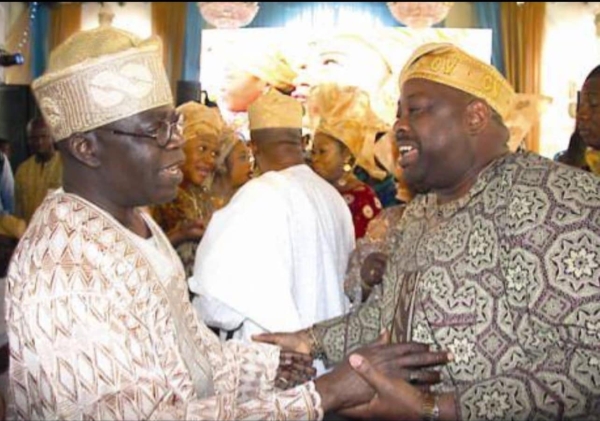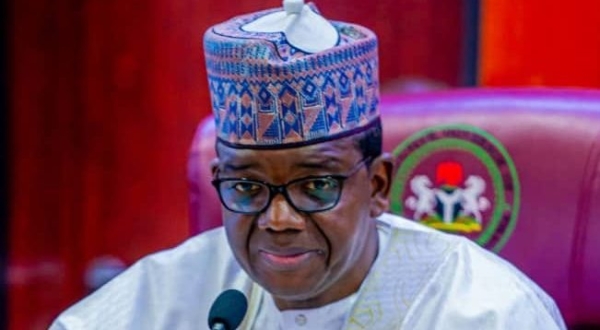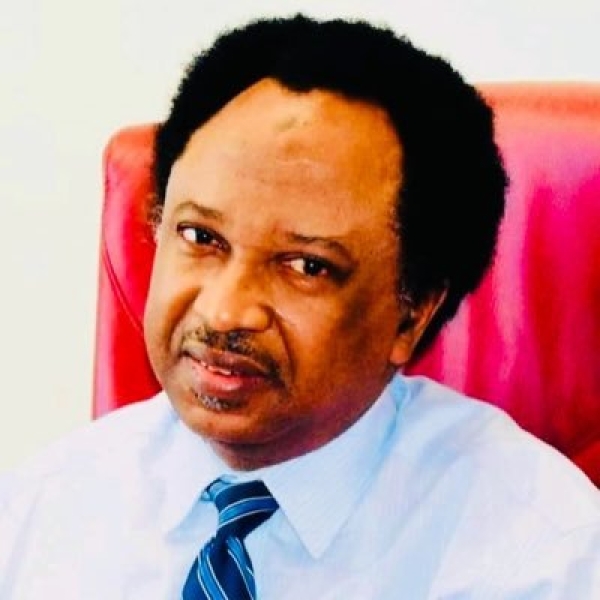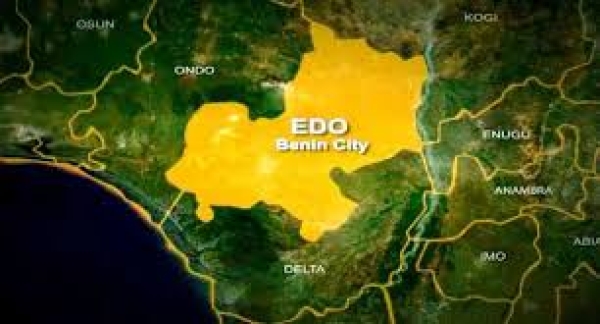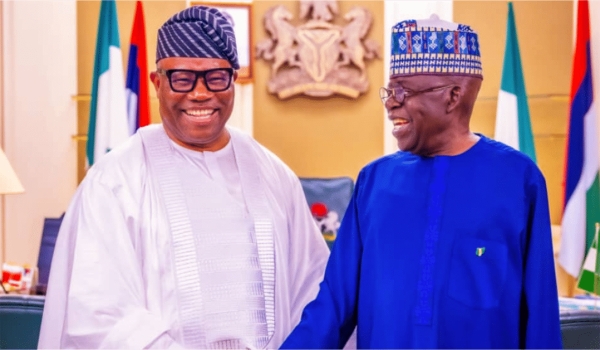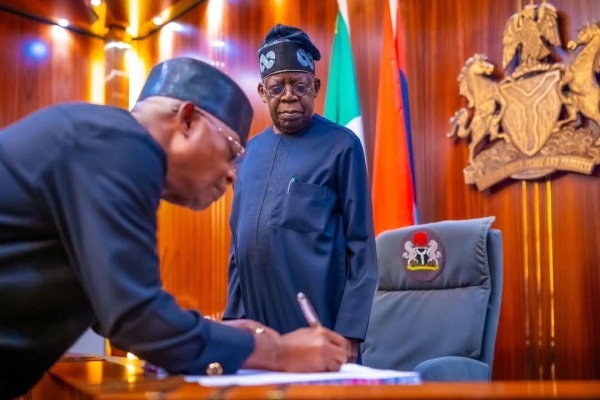TOP NEWS
Reuben's View
Search
MOST READ
-
[OPINION] A Psychologist Advises Godswill Akpabio: Let Go of the Struggle, Prioritize Healing for Yourself and the Nation, and Return Natasha Akpoti-Uduaghan Now - John Egbeazien Oshodi
-
Ambassadors: Tinubu Administration Screens Femi Fani-Kayode, Femi Pedro, Others
-
God told me RCCG council will one day hold meetings on the moon - Adeboye
-
‘I Will Not Ruin Everything Your Husband Built On Empty Stomach’ – Lizzy Anjorin Blasts Tope Alabi
-
Petitioner says moves to recall Natasha Akpoti will continue
-
Controversy Erupts Over Niger Delta Multimillion Naira Pipeline Protection Contracts
-
Nigerians May Pay Less As Global Oil Prices Drop
-
Segun Odegbami: ‘Sport has the power to change the world – how true?’
-
[OPINION] Humphrey Nwosu: Senate did not surprise me - Tonnie Iredia
-
“We Will Not Be Quiet” - Mass Protests Erupt Across U.S. As Thousands Rally Against Trump’s Policies
-
Nigerians Can Now Buy Food Without Struggle – Tinubu
959 times -
Concerns in Bayelsa As Gov Diri’s Supporters Fix Rally for Same Venue With Wike’s allies
669 times -
Edo Governorship Election Tribunal Judgment ‘Leaked’ Ahead Of Official Announcement - See Documents
610 times -
‘We’re Witnessing Something Worse Than Dictatorship, Please Don’t Kill Democracy’ – Dele Momodu Begs Tinubu
596 times -
Matawalle Paid Civil Servant ₦7,000 Instead Of ₦30,000 – Former Aide Alleges
595 times -
Mali, Burkina Faso, And Niger Impose 0.5% Levy On Imported Goods From Nigeria, Other ECOWAS Nations
572 times -
‘You Should Expect Me Back To Senate In 2027’ – Shehu Sani
559 times -
How They Murdered My Kano-bound Passengers In Edo — Truck Driver
544 times -
Akpabio Is Afraid Of Something, If Tinubu Says He Wants A Third Term, National Assembly Will Vote For Him’ – Dele Momodu
482 times -
Court Summons Tinubu, Ibas Over Rivers State Emergency Rule
445 times








![[OPINION] The Uromi 16 And The Problem With Nigeria - Reuben Abati [OPINION] The Uromi 16 And The Problem With Nigeria - Reuben Abati](https://reubenabati.com.ng/cache/mod_bt_contentslider/848d0c6943c9a9cb7639e8f5640d2cbf-4b585f7414a3fc875b761851d4c5fcd4_XL.jpg)
![[OPINION] Breakfast With The Soludos - Reuben Abati [OPINION] Breakfast With The Soludos - Reuben Abati](https://reubenabati.com.ng/cache/mod_bt_contentslider/a98b5c30f61dcb10378fdba9f5e472ab-33b747862875f50d863e709f5955da5d_XL.jpg)
![[OPINION] The Emerging Coalition Against Tinubu/APC - Reuben Abati [OPINION] The Emerging Coalition Against Tinubu/APC - Reuben Abati](https://reubenabati.com.ng/cache/mod_bt_contentslider/ddd6416fbaa008a5bcbc568f0e3c8857-02972c9f0dee40a6ad85830afbb49758_XL.jpg)
![[OPINION] Nasir El-Rufai’s Defections: PDP, CPC, APC, SDP - Reuben Abati [OPINION] Nasir El-Rufai’s Defections: PDP, CPC, APC, SDP - Reuben Abati](https://reubenabati.com.ng/cache/mod_bt_contentslider/817d1e0c4d951b18f15f406968204870-61d46cc1859ac5d4f70406214a7d7e4f_XL.jpg)
![[OPINION] A World Of Godfathers - Reuben Abati [OPINION] A World Of Godfathers - Reuben Abati](https://reubenabati.com.ng/cache/mod_bt_contentslider/f282a08e8e116be2577cc430882505bc-6d66582218d28730d47a7b9a32e18004_XL.jpg)
![[OPINION] Babangida’s Book - Reuben Abati [OPINION] Babangida’s Book - Reuben Abati](https://reubenabati.com.ng/cache/mod_bt_contentslider/c8905774fa75570e79f747809f6c142f-4452414e756ce827f8bc4b72b9376062_XL.jpg)
![[OPINION] Ayo Adebanjo and Alaperu Basibo: In Requiem - Reuben Abati [OPINION] Ayo Adebanjo and Alaperu Basibo: In Requiem - Reuben Abati](https://reubenabati.com.ng/cache/mod_bt_contentslider/32644a58ca6a6a9730d34e04e0b971d4-29f647f2f922ae7f6d08ba2b3025e7df_XL.jpg)
![[OPINION].The Coming Food Revolution In Lagos - Reuben Abati [OPINION].The Coming Food Revolution In Lagos - Reuben Abati](https://reubenabati.com.ng/cache/mod_bt_contentslider/a460cd374cf73b084bed0ea4a95f3470-f0e6dbf155e463f366df4402ca7102d3_XL.jpg)
![[OPINION] From Trump to Grammy Blues - Reuben Abati [OPINION] From Trump to Grammy Blues - Reuben Abati](https://reubenabati.com.ng/cache/mod_bt_contentslider/68a7f0df2b79f07ef9aa4da35fd3551f-a59719664df1d85791c7a182eca4b6a0_XL.jpg)
![[OPINION] Tanker Explosions, Avoidable Deaths - Reuben Abati [OPINION] Tanker Explosions, Avoidable Deaths - Reuben Abati](https://reubenabati.com.ng/cache/mod_bt_contentslider/d2e1e077711de20c5c40eeecc39c245f-8aaa25cc2241805d2decc75cc3486ec5_XL.jpg)
![[OPINION] The Second Coming Of Donald Trump - Reuben Abati [OPINION] The Second Coming Of Donald Trump - Reuben Abati](https://reubenabati.com.ng/cache/mod_bt_contentslider/3b214f2ffde1cfc7a1b2cf68cbf556f8-e0b50b219590b369fb715ce040483314_XL.jpg)
![[OPINION] Of Wildfires, Los Angeles, Obasa And Other Human Stories - Reuben Abati [OPINION] Of Wildfires, Los Angeles, Obasa And Other Human Stories - Reuben Abati](https://reubenabati.com.ng/cache/mod_bt_contentslider/2db7a112c548580c2fe54624dacb7951-419b0256c841d7d9b34a61d986a2e894_XL.jpg)



![[PRESS RELEASE] IGP Directs FID Operatives To Obtain Alhaji Sanusi’s Statement In Kano As NPF Withdraws Invitation Letter](https://reubenabati.com.ng/media/k2/items/cache/ed0d722f630b1731739ec5400196e3a3_XL.jpg?t=-62169984000)
![[OPINION] Nigeria and the fading lights of justice - Chidi Anselm Odinkalu](https://reubenabati.com.ng/media/k2/items/cache/ef2cf5d11bcf83a4e020129345d98fb5_XL.jpg?t=-62169984000)












![[OPINION] A Psychologist Advises Godswill Akpabio: Let Go of the Struggle, Prioritize Healing for Yourself and the Nation, and Return Natasha Akpoti-Uduaghan Now - John Egbeazien Oshodi](https://reubenabati.com.ng/media/k2/items/cache/2f0b1c914530ba8d1f3326706436118a_XL.jpg?t=-62169984000)
![[OPINION] I Got a Call —Apostolic Exhortation to the Household of Nigeria - Prince Charles Dickson](https://reubenabati.com.ng/media/k2/items/cache/8acacb3490b71d7942f1ffcd386a33a3_XL.jpg?t=-62169984000)
![[OPINION] Uromi Lynching: A Tragic Verdict On A Failed State - Isaac Asabor](https://reubenabati.com.ng/media/k2/items/cache/b33dac55af662fc13c67faff9d27a61b_XL.jpg?t=-62169984000)
![[OPINION] Profiling Natasha as Segilola, Sweetheart of 1001 Men - Festus Adedayo](https://reubenabati.com.ng/media/k2/items/cache/8f65eab95bf374d4088cf3ba7e11b130_XL.jpg?t=-62169984000)
![[OPINION] Embracing AI And Technology: A Call For Journalists To Stay Ahead - Isaac Asabor](https://reubenabati.com.ng/media/k2/items/cache/b5c25a2359489508b799d7ccc1c39101_XL.jpg?t=-62169984000)
![[OPINION] Martin Luther King Jr.: A Voice That Refuses To Be Silenced - Isaac Asabor](https://reubenabati.com.ng/media/k2/items/cache/37af26be02f238cf1e1fbb5df8558784_XL.jpg?t=1743926739)




![[OPINION] Great Ogboru alters predictions on Delta 2027 - Dele Sobowale](https://reubenabati.com.ng/media/k2/items/cache/8fb43f52ba7efd2c62e4abfd5bef5e89_XL.jpg?t=-62169984000)
![[OPINION] Humphrey Nwosu: Senate did not surprise me - Tonnie Iredia](https://reubenabati.com.ng/media/k2/items/cache/e7f52b185aa6d8c51397570db3a9ca33_XL.jpg?t=-62169984000)


![[OPINION] Anambra 2025: A case of no vacancy? - Law Mefor](https://reubenabati.com.ng/media/k2/items/cache/ed7a9e1188b16c48c4b3f6234db68523_XL.jpg?t=-62169984000)
![[OPINION] The Power Of Soft Power - Wole Olaoye](https://reubenabati.com.ng/media/k2/items/cache/131a7fd05300bc9f7a064d30e04bec6f_XL.jpg?t=-62169984000)


![[OPINION] Urgent Need to Expand Nigeria’s Anti-Graft Toolkit - Waziri Adio](https://reubenabati.com.ng/media/k2/items/cache/0f0e39f0f3809c9214c78682ba3fe3e2_XL.jpg?t=-62169984000)
![[OPINION] Much ado about Uromi - Bolanle Bolawole](https://reubenabati.com.ng/media/k2/items/cache/2931a70d30f50a2445c91fd76718d8ed_XL.jpg?t=-62169984000)
![[PRESS RELEASE] Atiku Mourns the Passing of Jerry Vampa, Devoted Aide of Over Three Decades](https://reubenabati.com.ng/media/k2/items/cache/b4c79c5ae215fe521a8afde529398f8b_XL.jpg?t=-62169984000)




![[PRESS RELEASE] IGP Directs FID Operatives To Obtain Alhaji Sanusi’s Statement In Kano As NPF Withdraws Invitation Letter [PRESS RELEASE] IGP Directs FID Operatives To Obtain Alhaji Sanusi’s Statement In Kano As NPF Withdraws Invitation Letter](https://reubenabati.com.ng/cache/mod_bt_contentslider/d582e3e91d3bd0cfd34210e5942ae4d6-ed0d722f630b1731739ec5400196e3a3_XL.jpg)
![[OPINION] Nigeria and the fading lights of justice - Chidi Anselm Odinkalu [OPINION] Nigeria and the fading lights of justice - Chidi Anselm Odinkalu](https://reubenabati.com.ng/cache/mod_bt_contentslider/3b13bf9580c0e6e2b3c4cf4eaf444d97-ef2cf5d11bcf83a4e020129345d98fb5_XL.jpg)












![[OPINION] A Psychologist Advises Godswill Akpabio: Let Go of the Struggle, Prioritize Healing for Yourself and the Nation, and Return Natasha Akpoti-Uduaghan Now - John Egbeazien Oshodi [OPINION] A Psychologist Advises Godswill Akpabio: Let Go of the Struggle, Prioritize Healing for Yourself and the Nation, and Return Natasha Akpoti-Uduaghan Now - John Egbeazien Oshodi](https://reubenabati.com.ng/cache/mod_bt_contentslider/3e3599e1a50cf78a9faab6784f6b4b1c-2f0b1c914530ba8d1f3326706436118a_XL.jpg)
![[OPINION] I Got a Call —Apostolic Exhortation to the Household of Nigeria - Prince Charles Dickson [OPINION] I Got a Call —Apostolic Exhortation to the Household of Nigeria - Prince Charles Dickson](https://reubenabati.com.ng/cache/mod_bt_contentslider/f07d885a698270c963890ae1706c16db-8acacb3490b71d7942f1ffcd386a33a3_XL.jpg)
![[OPINION] Uromi Lynching: A Tragic Verdict On A Failed State - Isaac Asabor [OPINION] Uromi Lynching: A Tragic Verdict On A Failed State - Isaac Asabor](https://reubenabati.com.ng/cache/mod_bt_contentslider/eab91a873d30dd2d132d20e43cbb8746-b33dac55af662fc13c67faff9d27a61b_XL.jpg)
![[OPINION] Profiling Natasha as Segilola, Sweetheart of 1001 Men - Festus Adedayo [OPINION] Profiling Natasha as Segilola, Sweetheart of 1001 Men - Festus Adedayo](https://reubenabati.com.ng/cache/mod_bt_contentslider/d54778ad2e8762472d8388c0e58acbaf-8f65eab95bf374d4088cf3ba7e11b130_XL.jpg)
![[OPINION] Embracing AI And Technology: A Call For Journalists To Stay Ahead - Isaac Asabor [OPINION] Embracing AI And Technology: A Call For Journalists To Stay Ahead - Isaac Asabor](https://reubenabati.com.ng/cache/mod_bt_contentslider/a8f8ed27caf2ec85140167be52e98f19-b5c25a2359489508b799d7ccc1c39101_XL.jpg)
![[OPINION] Martin Luther King Jr.: A Voice That Refuses To Be Silenced - Isaac Asabor [OPINION] Martin Luther King Jr.: A Voice That Refuses To Be Silenced - Isaac Asabor](https://reubenabati.com.ng/cache/mod_bt_contentslider/b54c3e32d04eca11f1f604036ec88d07-37af26be02f238cf1e1fbb5df8558784_XL.jpg)




![[OPINION] Great Ogboru alters predictions on Delta 2027 - Dele Sobowale [OPINION] Great Ogboru alters predictions on Delta 2027 - Dele Sobowale](https://reubenabati.com.ng/cache/mod_bt_contentslider/7447a32a4df44ed43457d177c579a627-8fb43f52ba7efd2c62e4abfd5bef5e89_XL.jpg)
![[OPINION] Humphrey Nwosu: Senate did not surprise me - Tonnie Iredia [OPINION] Humphrey Nwosu: Senate did not surprise me - Tonnie Iredia](https://reubenabati.com.ng/cache/mod_bt_contentslider/c899233a52583836b710bc26b390fb03-e7f52b185aa6d8c51397570db3a9ca33_XL.jpg)


![[OPINION] Anambra 2025: A case of no vacancy? - Law Mefor [OPINION] Anambra 2025: A case of no vacancy? - Law Mefor](https://reubenabati.com.ng/cache/mod_bt_contentslider/685ad4c31077e392bb41826d98f1ac6e-ed7a9e1188b16c48c4b3f6234db68523_XL.jpg)
![[OPINION] The Power Of Soft Power - Wole Olaoye [OPINION] The Power Of Soft Power - Wole Olaoye](https://reubenabati.com.ng/cache/mod_bt_contentslider/4b4a0344d021e216f9a50a83c708825f-131a7fd05300bc9f7a064d30e04bec6f_XL.jpg)


![[OPINION] Urgent Need to Expand Nigeria’s Anti-Graft Toolkit - Waziri Adio [OPINION] Urgent Need to Expand Nigeria’s Anti-Graft Toolkit - Waziri Adio](https://reubenabati.com.ng/cache/mod_bt_contentslider/e7fbe0e60b0f49cfe1032bdf43313ccf-0f0e39f0f3809c9214c78682ba3fe3e2_XL.jpg)
![[OPINION] Much ado about Uromi - Bolanle Bolawole [OPINION] Much ado about Uromi - Bolanle Bolawole](https://reubenabati.com.ng/cache/mod_bt_contentslider/3fe4f6762de618610819d74e931a791f-2931a70d30f50a2445c91fd76718d8ed_XL.jpg)
![[PRESS RELEASE] Atiku Mourns the Passing of Jerry Vampa, Devoted Aide of Over Three Decades [PRESS RELEASE] Atiku Mourns the Passing of Jerry Vampa, Devoted Aide of Over Three Decades](https://reubenabati.com.ng/cache/mod_bt_contentslider/4705cb34c186bb597f40f3b2f68e290a-b4c79c5ae215fe521a8afde529398f8b_XL.jpg)

























![[OPINION] Nigeria: A country run haphazardly - Ugoji Egbujo [OPINION] Nigeria: A country run haphazardly - Ugoji Egbujo](https://reubenabati.com.ng/cache/mod_bt_contentslider/bd8c2edc76a4c0f82cf7c4e568ae5322-d2d472ede4ca6b710531a375bb18707e_XL.jpg)



![[OPINION] Tinubu, Atiku, and Argentina: United by Pain, Divided by Rhetoric - Farooq A. Kperogi [OPINION] Tinubu, Atiku, and Argentina: United by Pain, Divided by Rhetoric - Farooq A. Kperogi](https://reubenabati.com.ng/cache/mod_bt_contentslider/752dcfe50440f2863b33db9c53f11c76-f8dce5cb80263ca6b540fcad159b8542_XL.jpg)
![[OPINION] Between Banks’ Soaring Profits and Economic Realities - Obinna Chima [OPINION] Between Banks’ Soaring Profits and Economic Realities - Obinna Chima](https://reubenabati.com.ng/cache/mod_bt_contentslider/770c846305a238f8db1287c6e154e66e-49b81d144a6a09f8a1fd212e4808016f_XL.jpg)
![[OPINION] Akpabio and the Price of Loyalty - Clementina Daika [OPINION] Akpabio and the Price of Loyalty - Clementina Daika](https://reubenabati.com.ng/cache/mod_bt_contentslider/c7e7cc8dca04d56fb06939018942d1aa-bfe599948947e2487226cf2840df48d5_XL.jpg)

![[PRESS RELEASE] Reports of Atiku Abubakar’s Resignation from PDP Are Malicious Lies and a Political Hatchet Job [PRESS RELEASE] Reports of Atiku Abubakar’s Resignation from PDP Are Malicious Lies and a Political Hatchet Job](https://reubenabati.com.ng/cache/mod_bt_contentslider/e52d43d938b0e3c0c182075461673853-f212bb1e44fe8e2c6f99f42e384c30bd_XL.jpg)


















![[STATEHOUSE PRESS RELEASE] President Tinubu Mourns Bauchi-based Cleric Dr Idris Abdulaziz Dutsen Tanshi [STATEHOUSE PRESS RELEASE] President Tinubu Mourns Bauchi-based Cleric Dr Idris Abdulaziz Dutsen Tanshi](https://reubenabati.com.ng/cache/mod_bt_contentslider/28d0bb299ad23d3758ba62b1a92cc3c6-61d8d990d090dc83208401c94c1cd738_XL.jpg)


![[OPINION] Akpabio’s supernatural powers - Etim Etim [OPINION] Akpabio’s supernatural powers - Etim Etim](https://reubenabati.com.ng/cache/mod_bt_contentslider/2d92131b1969b237decc9c920f661c66-a058265916b787aa5f45ebae1dc03914_XL.jpg)









![[OPINION] Natasha: It calls for care - Abdu Rafiu [OPINION] Natasha: It calls for care - Abdu Rafiu](https://reubenabati.com.ng/cache/mod_bt_contentslider/ca34ed3221cd69d03a4d3d04b2bbcdd1-6599dd8163f65e5eca40e3beb201f785_XL.jpg)


![[OPINION] Corps Members vs. NYSC: AGF Fagbemi, Where Is The Justice Under A Constitutional Government? - John Egbeazien Oshodi [OPINION] Corps Members vs. NYSC: AGF Fagbemi, Where Is The Justice Under A Constitutional Government? - John Egbeazien Oshodi](https://reubenabati.com.ng/cache/mod_bt_contentslider/efba7349de4d6c055562df81349875d7-0091164233e6484ca83a177032934d87_XL.jpg)







![[OPINION] Niger Delta sports festival - Toyin Ibitoye [OPINION] Niger Delta sports festival - Toyin Ibitoye](https://reubenabati.com.ng/cache/mod_bt_contentslider/da0dc8c5c4990d9be81c1acf68c79740-da5bba5974013839ed4ff6942550e66e_XL.jpg)





![[OPINION] A Psychologist Advises Godswill Akpabio: Let Go of the Struggle, Prioritize Healing for Yourself and the Nation, and Return Natasha Akpoti-Uduaghan Now - John Egbeazien Oshodi](/media/k2/items/cache/2f0b1c914530ba8d1f3326706436118a_XL.jpg)

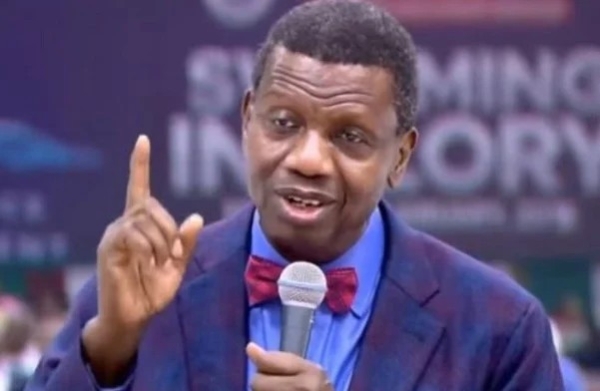

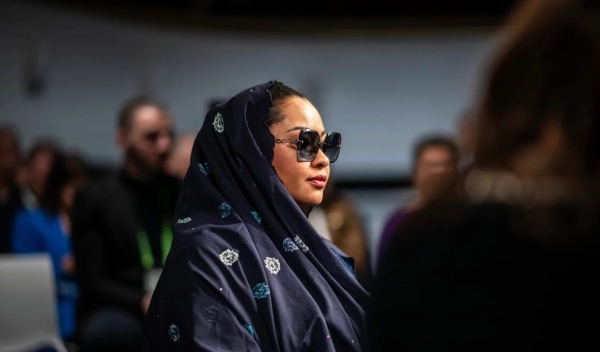


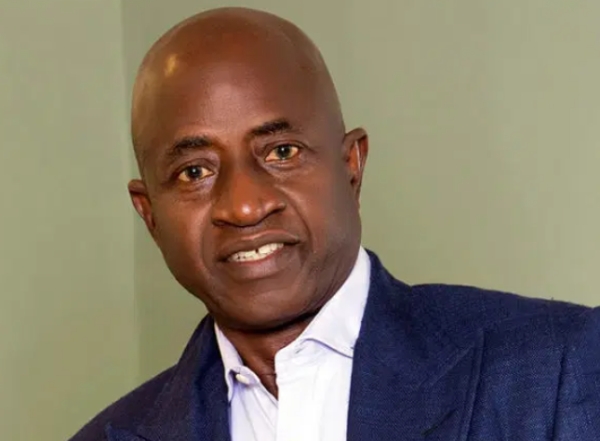
![[OPINION] Humphrey Nwosu: Senate did not surprise me - Tonnie Iredia](/media/k2/items/cache/e7f52b185aa6d8c51397570db3a9ca33_XL.jpg)

